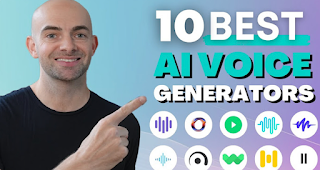AI Voice Generator
AI voice generators, also known as text-to-speech (TTS) systems, are software programs or algorithms that convert written text into spoken audio. These systems use artificial intelligence (AI) and machine learning techniques to generate natural-sounding speech that mimics human speech patterns, intonation, and pronunciation.
AI voice generators can be used for a variety of purposes, including:
Accessibility:
They enable individuals with visual impairments or reading difficulties to access written content by converting it into spoken form.
Content Creation:
They allow content creators to generate audio versions of their written content, such as articles, blog posts, or e-books, to reach a broader audience or provide additional value to their audience.
Virtual Assistants:
They power virtual assistants and chatbots by providing them with the ability to communicate verbally with users, enhancing the user experience and enabling more natural interactions.
Entertainment:
They are used in entertainment applications, such as voice-overs for animations, video games, or audiobooks, to bring characters or narratives to life.
Language Learning:
They assist language learners by providing audio pronunciation of words, phrases, or sentences in different languages, helping learners improve their listening and speaking skills.
AI voice generators work by processing the input text through various linguistic and speech synthesis algorithms to generate a corresponding audio waveform. These systems have advanced significantly in recent years, with improvements in naturalness, expressiveness, and customization options, allowing for a wide range of applications across different industries and domains.
Music Industry:
Music artists are expressing growing concern over the rise of AI-generated voices in the music industry. This innovation, while offering new opportunities for creativity and efficiency, has sparked debates regarding authenticity, creative control, and the future of human talent in music.
One of the primary reasons for artists' unease is the issue of authenticity. Musicians invest their time, emotions, and experiences into their craft, using their unique voices as a means of personal expression. AI-generated voices lack the human touch and emotional depth that comes from genuine performances, raising questions about the integrity and soulfulness of the music created with these tools.
Artists value creative control over their work, including the selection of vocalists and the nuances of their performances. The emergence of AI-generated voices threatens this control by providing an alternative, automated method of vocalization that diminishes the artist's influence and input. This loss of control can be disheartening for artists who take pride in crafting every aspect of their music.
AI-generated voices present a potential challenge to human vocalists by offering a cheaper, faster, and more customizable alternative for creating music. This competition for opportunities in the music industry raises concerns about job displacement and the devaluation of human talent, further exacerbating tensions within the industry.
"I Fooled the World with a Fake Taylor Swift Song" Youtube Video
There are legal and ethical implications surrounding the use of AI-generated voices in music production. Artists worry about the unauthorized use of their likeness or voice to create AI-generated vocals without their consent, raising questions about copyright ownership and intellectual property rights.
Ultimately, while AI-generated voices offer exciting possibilities for music production and composition, they also raise complex challenges and uncertainties for artists. As the technology continues to evolve, artists and industry stakeholders will need to navigate these issues thoughtfully to ensure that creativity, authenticity, and human talent remain central to the music-making process.



Comments
Post a Comment